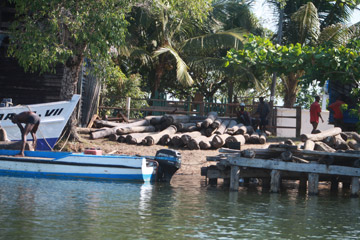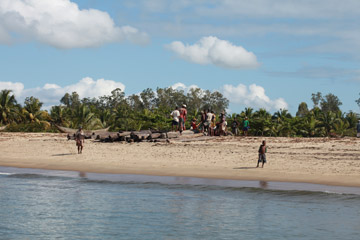Numerous species of rosewood and ebony from Madagascar, Latin America, and Southeast Asia were granted protection today at the Convention on International Trade in Endangered Species (CITES) in Bangkok, Thailand. The ruling comes one day after CITES granted the first protections ever to sharks and manta rays.
“Yesterday sharks, today timber: we appear to be witnessing a new direction for the world’s wildlife trade Convention,” said David Newton, TRAFFIC’s Director in East and Southern Africa.
The new rules will cover all of Madagascar’s ebony species, which currently numbers around 80, as well as the nation’s rosewood. In recent years, Madagascar has seen many of its forests illegally plundered for rosewood and ebony. The crisis, which began following a government coup in 2009 and is still ongoing, has placed Madagascar’s already-fragile forests and biodiversity at risk.
 Hardwood logs likely cut from Masoala National Park being loaded in Maroantsetra, Madagascar in October 2009.  Rosewood logs on a beach in Maroantsetra, Madagascar. Photos by Rhett A. Butler. |
“[The listing of these species] will greatly strengthen Madagascar’s enforcement efforts to protect these commercially valuable but threatened species,” said Newton.
New protections will also cover Siam rosewood (Dalbergia cochinchinensis), Brazilian rosewood (Aniba rosaeodora), and other rosewood species native to Central America.
The Environmental Investigation Agency (EIA) said that new rules governing Siam rosewood will be especially important as it will make it more difficult for trader and illegal loggers to smuggle the species to China, where much of the world’s illegal wood ends up for processing.
“With this listing, the consumer markets will need to work with Thailand and the range states of Cambodia, Vietnam and Laos to ensure Siam Rosewood is actually protected, especially as there is a logging ban in Thailand,” explains Faith Doherty, head of EIA’s Forests Campaign. “Finally, we have a legal tool to use in China, the main destination and where rosewood prices on the black market are spurring a flood of smuggling and associated violence.”
The smuggling trade has erupted in firefights between Thai enforcement agencies and Cambodian illegal loggers, resulting in dozens of deaths according to the EIA.
Rosewood and ebony are often used to make high-end products, including luxury furniture, musical instruments, and chess pieces. Although historically such pieces have ended up largely in the industrialized world, demand is on the rise in China for these high-end woods. Currently, a single cubic meter of Siam rosewood can fetch as much as $50,000 in China.
According to the UNEP and INTERPOL, the illegal logging trade is worth $30-$100 billion each year, accounting for 15-30 percent of all deforestation in the tropics. The trade not only devastates forests, but often cuts off local people from vital resources, robs governments of important tax revenue, and comes with other crimes such as human trafficking, drugs, and weapons sales. Long-neglected, the fight against illegal logging has been on the rise in recent years. The U.S., Australia, and the EU all have laws that make it a crime to import and sell any wood products made from illegally logged timber in its native country. Meanwhile, Interpol recently conducted a massive sting against illegal loggers in Central and South America. New protections under CITES can only help stem the trade.
“Today the meeting lived up to its expectations for timber species,” concluded Newton.
Related articles
New illegal logging ban in EU could sever all ties with companies working in DRC

(03/04/2013) Yesterday, the EU joined the U.S. and Australia in banning all timber that was illegally harvested abroad. The new regulation could have a major impact on where the EU sources its timber, and no where more so than the Democratic Republic of Congo (DRC). According to a new report by Greenpeace, the DRC’s current moratorium on industrial logging is being systematically circumvented making all timber from the country suspect.
First strike: nearly 200 illegal loggers arrested in massive sting across 12 countries
(02/20/2013) One-hundred-and-ninety-seven illegal loggers across a dozen Central and South American countries have been arrested during INTERPOL’s first strike against widespread forestry crime. INTERPOL, or The International Criminal Police Organization, worked with local police forces to take a first crack at illegal logging. In all the effort, known as Operation Lead, resulted in the seizure of 50,000 cubic meters of wood worth around $8 million.
Rosewood in Belize: the truth behind the smoke
(02/11/2013) In Belize, the uncontrolled and often illegal harvesting of rosewood has been, and still is, one of the major environmental issues in the country. In March of last year, the government established a moratorium on the export and extraction of rosewood, however illegal harvesting continued. On Friday 11 January, the Minister of Forestry, Fisheries and Sustainable Development made the bold move of burning confiscated illegally cut rosewood flitches.
Report: nearly half the timber from Mozambique to China is illegal
-EIA.150.jpg)
(02/07/2013) Forty-eight percent of the timber making its way from Mozambique’s forests to Chinese companies was harvested illegally, according to a new report by the Environmental Investigation Agency (EIA), which blames the problem on widespread corruption and poor governance. The illegal logging cost Mozambique, the world’s fourth least-developed country in the world according to the UN, $29 million in tax revenue, says the report.
Amphibian, tapir paradise in Honduras being ravaged by illegal deforestation
(02/06/2013) Located in a mountainous area near the border with Guatemala, Cusuco National Park in Honduras is recognized by researchers as a critical refuge for endangered amphibians in a country that has suffered from widespread deforestation. But while the park largely escaped the devastation that has affected other protected areas in Honduras, the situation seems to be changing: since 2010 there has been a sharp increase in deforestation. Poachers, small farmers, and cattle ranchers are moving into the park using a network of research trails and camps established by Operation Wallacea, a British conservation science NGO.
Illegally logged trees to start calling for help
(01/24/2013) Illegal loggers beware: trees will soon be calling—literally—for backup. The Brazilian government has begun fixing trees with a wireless device, known as Invisible Tracck, which will allow trees to contact authorities after being felled and moved.
Illegal logging, mining worsened impact of Philippines’ killer typhoon
(12/06/2012) According to Filipino officials, rampant illegal logging and mining were likely a part of the cause for the high casualty count from Category 5 Typhoon Bopha (Pablo), especially in the Compostela Valley where government officials had warned people to stop the illegal activities. So far, 370 people have been found dead on the island of Mindanao with another 400 missing. Waters rose so high even emergency shelters were inundated.
‘Exporting deforestation’: China is the kingpin of illegal logging
-EIA.150.jpg)
(11/29/2012) Runaway economic growth comes with costs: in the case of China’s economic engine, one of them has been the world’s forests. According to a new report by the Environmental Investigation Agency (EIA), China has become the number one importer of illegal wood products from around the world. Illegal logging—which threatens biodiversity, emits carbon, impoverishes local communities, and is often coupled with other crimes—has come under heavy pressure in recent years from the U.S., the EU, and Australia. Each of these has implemented, or will soon implement, new laws that make importing and selling illegal wood products domestic crimes. However, China’s unwillingness to tackle its vast appetite for illegal timber means the trade continues to decimate forests worldwide.
Australia outlaws illegally-logged wood from abroad
(11/21/2012) In another blow to illegal loggers, Australia has passed the Illegal Logging Prohibition Bill, joining the U.S. in outlawing the importation of illegal logged timber from abroad. The new legislation makes it a criminal offense for Australian businesses to import timber from illegal operations. The Australian government estimates that $400 million worth of illegal timber products are sold in the country each year often as outdoor furniture and wood for decks